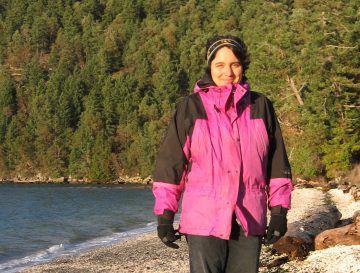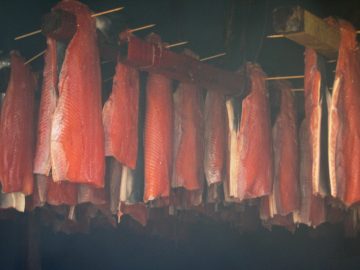IRES Seminar Series
Time: 12:30pm to 1:30pm (every Thursday)
Location: AERL Theatre (room 120), 2202 Main Mall
***************************************************************************
From subsistence to sovereignty: On the meaning and measurement of the right to fish for the ‘Namgis First Nation
Terre Satterfield, Professor of Culture, Risk and the Environment, IRES;
Co-authors: Leslie Robertson, Anton Pitts, Nathan Vadeboncoeur, Diane Jacobson
The colonial history of First Nations fishing on the British Columbia coast is undeniably a history of dispossession and an often-brutal restructuring of indigenous food regimes. This included but was not limited to the criminalization of acts of fishing (e.g., use of weirs and traps), trade and territorial access; the reduction of all fishing to household need only; and the racial assignation of licenses and fishing permission to non-aboriginal fishers only. More recently, a series of supreme court decisions have begun to overturn some restrictions, and myriad acts of ‘practicing fishing rights’ are evident on the ground. Going fishing has thus become (with due critical humor): “Ted is out practicing his aboriginal rights [to fish]”. But, just what the right to fish or harvest other traditional foods might mean is an open question. This collaborative study examines one effort to answer a challenge posed by the ‘Namgis First Nation: What would it take to become food sovereign? By food sovereign, we mean practicing fully the right to feed a community of 1000 through local hunting, fishing, gathering, cultivating and processing primarily traditional foods? What would and could people eat daily? How much is needed and by what logic? Can food be processed, stored and distributed locally? And what other kinds of local food production might also make sense? The answer is varied and often surprising, particularly when considered in juxtaposition to the cost and effort of procuring market foods. Results include discussion of different possible diets, the social life and organization of food, and the potential for a renewed and vital food system. We conclude with a brief set of theoretical challenges to theories of food sovereignty and their meaning in the face of empirical and field-based examinations of the possibilities for becoming food sovereign.

Click for Terre’s Bio: http://ires.ubc.ca/person/terre-satterfield/
Terre Satterfield is an interdisciplinary social scientist; professor of culture, risk and the environment; and (after five years) is outgoing director of the University of British Columbia’s Institute for Resources, Environment and Sustainability. Her research concerns sustainable thinking and action in the context of environmental management and decision making. She studies natural resource controversies; cultural risk and cultural ecosystem services; and the perceived risk of new technologies (gene drive and nano-technologies). Recently she has also worked on tensions between indigenous communities and the state and/or regulatory dilemmas regarding First Nations interest and environmental assessment. Her work with co-authors (many of whom are part of IRES) has been published in journals such as: Nature; Proceedings of the National Academy of Sciences; Environmental Science and Technology; PLOS One; Global Environmental Change; Ecological Applications, Conservation Biology; Ecology and Society; Journal of Environmental Management; Biosciences; Land Economics; Science and Public Policy; Ecological Economics; and Risk Analysis. Her books include: The Anatomy of a Conflict: Emotion, Knowledge and Identity in Old Growth Forests; What’s Nature Worth? (with Scott Slovic); and The Earthscan Reader in Environmental Values (with Linda Kalof).

Photo Credit: Adam Bautz from flickr/ Creative Commons
Carlina Kim
Administrative Assistant for Institute for Resources, Environment and Sustainability (IRES)
B.Sc Environmental Sciences
The University of British Columbia | Vancouver Campus
Aquatic Ecosystems Research Laboratory (AERL Building)
Room 428-2202 Main Mall | Vancouver, BC | V6T 1Z4
Email: carlina.kim@ubc.ca
Website: www.ires.ubc.ca
 Follow
Follow